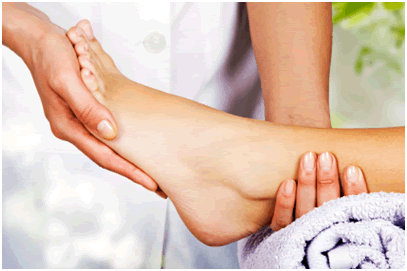 Morton's Neuroma occurs when a nerve between the third and fourth or the second and third toes becomes compressed or injured. Those with Morton's neuroma may typically feel sharp pain, burning, or numbness in the foot and the nerves may thicken causing a visible lump in the foot. According to Dr. Anthony Komaroff of Harvard Medical School, women are at a greater risk because they usually wear tight shoes or high heels. One of the best ways to prevent and treat Morton's neuroma is to wear low heeled shoes with a wider toe box so the bones, ligaments, muscles and nerves, are not squeezed. Dr. K also recommends massaging the area or visiting your foot care professional for metatarsal pads to help correct any structural problems you may have. If the pain persists, doctors may inject a local anesthetic with corticosteroid to reduce inflammation. Surgery may be needed if the previously mentioned methods do not work.
Morton's Neuroma occurs when a nerve between the third and fourth or the second and third toes becomes compressed or injured. Those with Morton's neuroma may typically feel sharp pain, burning, or numbness in the foot and the nerves may thicken causing a visible lump in the foot. According to Dr. Anthony Komaroff of Harvard Medical School, women are at a greater risk because they usually wear tight shoes or high heels. One of the best ways to prevent and treat Morton's neuroma is to wear low heeled shoes with a wider toe box so the bones, ligaments, muscles and nerves, are not squeezed. Dr. K also recommends massaging the area or visiting your foot care professional for metatarsal pads to help correct any structural problems you may have. If the pain persists, doctors may inject a local anesthetic with corticosteroid to reduce inflammation. Surgery may be needed if the previously mentioned methods do not work.
Morton's neuroma can be a difficult condition to live with. If you would like to learn more about your Morton's neuroma and possible treatment options, speak to Dr. Joshua David Scoll of Pennsylvania. Our doctor will diagnose and treat your feet accordingly.
Morton's Neuroma
Morton's neuroma is a painful foot condition that commonly affects the areas between the third and fourth toe and the ball of the foot, although other areas of the foot are also susceptible to this condition. Morton's neuroma is caused by an inflamed nerve in the foot that is being squeezed and aggravated by surrounding bones. Women are more likely than men to have an occurrence of this foot condition.
What Increases the Chances of having Morton's Neuroma?
-Ill-fitting high heels or shoes that add pressure to the toe or foot area.
-Jogging, running and any sports that involve constant impact to the foot area.
-Flat feet, bunions, and any other foot deformity may put you at a higher risk for developing Morton's neuroma.
If you suspect that you may have this condition, you should visit your podiatrist. A podiatrist will first conduct a thorough physical examination to check for palpable masses between the bones of the foot.
If you have any questions, please contact our offices located in Philadelphia and Bensalem, PA. We offer the newest diagnostic and treatment technologies for all your foot care needs.
